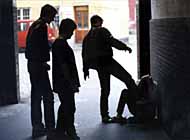Education affects youths’ violent behaviour, study shows

Nearly two thirds of all youth violence in Zurich is committed by children with only a limited school education, a new study says.
Conducted by a University of Zurich sociologist, the study says the theory that children with a low level of schooling, from less educated backgrounds, tend to be more violent than children whose parents have had higher secondary schooling.
Children who are still at, or have only been as far as, compulsory school (up to age 15) in the low academic branch commit some 64 per cent of all juvenile violence in Canton Zurich. Among that group, young people between ages 15 and 18 commit most of the crimes.
College students
Proportionally, young people with higher education commit a small number of violent crimes. College students carry out only nine per cent of these acts. In the Swiss system college is an academic branch for children aged nine to 12.
Finally, students aged 13 to 18 who are enrolled in high school, only account for one per cent of all violent juvenile crime in Canton Zurich. Children who do not fit into these categories commit the remaining 17 per cent of juvenile crimes in Zurich.
The study indicated that the children’s parents, too, tended to have lower levels of education. The fathers of nearly 40 per cent of the children or youths who committed violent crimes in canton Zurich were labourers; only 2.4 per cent of the fathers had a university diploma.
Boys were involved in 92 per cent of the cases.
The most frequent form of juvenile violence in the canton was theft (40 per cent), followed by minor bodily injury (14.3 per cent), assault (13.5 per cent) and murder (0.26 per cent).
The analysis was carried out based on the figures supplied by youth lawyers concerning 757 cases of juvenile violence between 1995 and 1997.
Some reasons
The spokesman for the Canton Zurich Prosecutor’s Office, Hans-Ulrich Gürber, told Swiss info that an ongoing rise in juvenile crime is not surprising.
“The tendency can be explained in several ways. First, there was a general recession between 1991 and 1996. This meant it was difficult for young people to enter the job market especially when they did not have higher school education.
“The recession also diminished apprenticeship opportunities. Some psychological factors may have also played a part,” Gürber said.
French-speaking area
In the French speaking area of Switzerland, one of the two presidents of the Juvenile Court in Lausanne, Hélène Châtelain, told swissinfo that juvenile crime is on the rise and has become more violent in Canton Vaud.
“Beforehand we dealt mostly with 16- and 17-year-olds, however the average age has dropped considerably. There now appears to be more serious and violent acts committed, often over very small issues, by 12- and 13-year-olds”.
Châtelain said the type of juvenile crime committed in canton Vaud has changed. “Youth delinquency occurs more and more frequently in a group situation, which explains an increase in the degree of violence and lack of measure. Children exercise less constraint as a group. This increases the risk of more serious and violent crime among the very young”.
Canton Vaud has recorded a 26 per cent rise in juvenile crime over the past ten years. The number of cases presented to Juvenile Court has also risen. In 1991 there were 1921 juvenile court cases in canton Vaud, whereas last year there were 2,986.
The figures showed that crime was rising faster than the population level.
The statistics were particularly relevant considering that the courts no longer deal with crimes such as moped theft or marijuana smoking. In order to lighten the load on the backlogged judges, two years ago a large proportion of petty crimes became punishable by fine.
Samantha Tonkin and Devra Pitt

In compliance with the JTI standards
More: SWI swissinfo.ch certified by the Journalism Trust Initiative
You can find an overview of ongoing debates with our journalists here. Please join us!
If you want to start a conversation about a topic raised in this article or want to report factual errors, email us at english@swissinfo.ch.